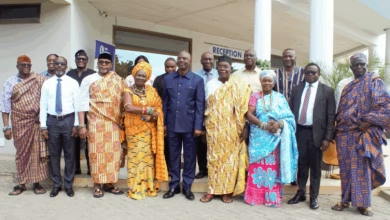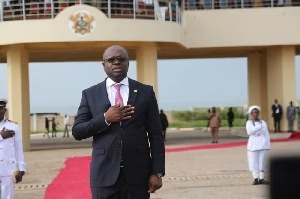NDC to Focus on Private Sector-Led Initiatives in Next Government, Announces Isaac Adongo

- NDC plans to use $1 billion investment model for projects.
- Government and private sector will each contribute $200 million for the Accra-Kumasi road.
- Adongo trusts private sector over government for investment reliability.
- NDC aims to leverage private sector involvement while reducing direct government intervention.
The National Democratic Congress (NDC) has announced plans to introduce more private-sector initiatives in its next government to reduce the government’s involvement in business operations.
Speaking on Joy News’ PM Express, Isaac Adongo, the spokesperson on the economy for NDC flagbearer John Mahama, stated that a lean government would free up significant resources for other ventures.
“The idea of running a lean government will save the country a lot of money to channel into other ventures,” Adongo stated, underscoring the party’s commitment to efficient governance.
Mr Adongo defended Mr Mahama’s 680 campaign promises, asserting that they are both realistic and achievable.
“It’s not the number of promises, it is the quantum of the envelope. If you look at the programs that we have planned and the policies that we have put together that are geared towards providing some level of realignment, you would understand that this can be funded,” he explained.
The National Democratic Congress (NDC) has outlined its strategy for financing development projects with a focus on transparency, emphasizing the use of Public-Private Partnerships (PPP) and development finance. This approach is intended to bolster infrastructure and other key initiatives without over-relying on government funds.
Isaac Adongo highlighted the success of previous projects during the Mahama administration, such as the $1.5 billion development of the Tema Harbour (MPS) and the construction of Terminal 3. These projects were completed without placing additional strain on the government budget, demonstrating the efficacy of leveraging external finance.
The NDC’s strategy for future infrastructure projects, including the dualization of the Accra-Kumasi road, involves utilizing the Ghana Infrastructure Investment Fund (GIIF) and collaborating with multilateral institutions. This approach aims to maximize investment while minimizing direct government expenditure.
Adongo explained how the party plans to set up investment vehicles where the government would become a stakeholder with $500 million. This investment would be used to secure additional funding, effectively leveraging a total of $1 billion for development projects.
By utilizing these financial strategies and partnerships, the NDC aims to advance its development agenda while maintaining fiscal responsibility and enhancing the efficiency of project funding.
Isaac Adongo explained how the NDC plans to fund major projects using a $1 billion investment model. For instance, if the dualization of the Accra-Kumasi road costs $400 million, the strategy involves the government contributing $200 million and private sector investors matching that amount with another $200 million.
Addressing concerns about involving the private sector amid doubts about Ghana’s creditworthiness, Adongo expressed confidence in private sector investments. He argued that private sector entities have robust risk management practices and principles that ensure a return on investment, which makes them a reliable partner.
Adongo emphasized that the NDC aims to implement programs that leverage private sector involvement while minimizing direct government intervention. This approach is designed to harness the benefits of private investment without placing undue financial strain on the government.






